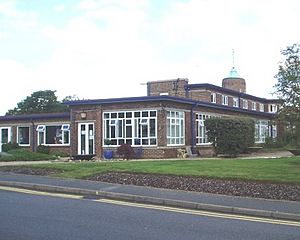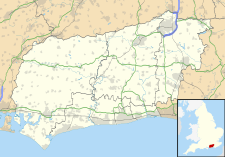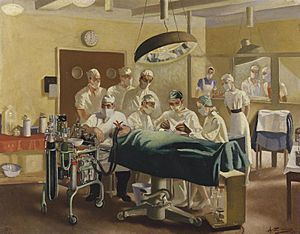Queen Victoria Hospital facts for kids
Quick facts for kids Queen Victoria Hospital |
|
|---|---|
| Queen Victoria Hospital NHS Foundation Trust | |

Queen Victoria Hospital
|
|
| Geography | |
| Location | East Grinstead, West Sussex, England |
| Coordinates | 51°08′07″N 0°00′07″E / 51.135309°N 0.001827°E |
| Organisation | |
| Care system | National Health Service |
| Services | |
| Emergency department | Minor injuries unit only |
| Beds | 80 |
| History | |
| Founded | 1863 |
The Queen Victoria Hospital (QVH) is a special hospital in East Grinstead, West Sussex, England. It's famous for its amazing work in reconstructive surgery, which helps people who need parts of their body rebuilt after injuries or illnesses. It also provides care for people with severe burns. The hospital is named after Queen Victoria and is managed by the Queen Victoria Hospital NHS Foundation Trust.
In 2021, there were talks about the hospital joining with another hospital group. However, these plans were stopped in September 2022.
Contents
A Look Back: The Hospital's Story
The Queen Victoria Hospital started as the East Grinstead Cottage Hospital in 1863. It changed its name to "Queen Victoria Hospital" in the 1930s. The hospital then moved to its current location in 1936.
During the Second World War, QVH became a very important place. It was a special unit for treating burns. Sir Archibald McIndoe led this unit. He helped many pilots and aircrew from the Royal Air Force and other allied forces. These brave people had serious burns or injuries and needed plastic surgery to help them recover.
In 1941, the Guinea Pig Club was formed at the hospital. This was a social club and support group for the injured airmen and their families. The club continued to help its members for many years after the war. They met regularly in East Grinstead until 2007. Today, the Queen Victoria Hospital is still a leader in specialist care. It is well-known for its excellent burns treatment and expert staff across England.
In recent years, the hospital has been updated. In 2012, a new outpatients department opened. The burns and children's units were also made new. Six new operating rooms were opened by the Princess Royal in October 2013.
What Services Does QVH Offer?
The hospital is a top centre for treating burns and for reconstructive surgery. Reconstructive surgery uses special methods like tissue transplant and microvascular surgery. These help to fix parts of the body that have been damaged by illness, accidents, or major operations. They also help people born with certain conditions.
Here are some of the special units at QVH:
- Burns Centre: This centre provides expert care for people with burns in the South East of England. The hospital works with the Kent Police to teach young people about firework dangers. A young woman who was treated at QVH after a firework injury made a video to share her story.
- Corneo Plastic Unit: This unit was started in the 1940s. It focuses on corneal transplantation surgery, which helps people with eye problems. It also works on oculoplastics, which is surgery around the eye. The hospital also had an eye bank that started in 1952. This unit still performs corneal transplantation and other eye surgeries. A doctor at the hospital, Raman Malhotra, found a new way to treat a condition called Blepharospasm.
- Plastic Surgery Unit: QVH is a major centre for Plastic Surgery. They also perform Hand surgery. Doctors at the hospital have shared videos of complex hand operations online. For example, surgeons at QVH successfully reattached a man's arm in a long operation. He was able to use his fingers again afterwards.
- Maxillofacial Surgery: This unit is known around the world for training new doctors. Their staff are experts in many areas, including oral surgery, orthodontics, and fixing facial trauma. They also work on head and neck cancer and rebuilding faces and jaws.
- Therapies Department: This department helps patients get better after their special treatments. It also offers many services for the local community. These include physiotherapy, clinics for back pain, and speech and language therapy. They also help people with Parkinson's disease. This department is part of a large team that helps people with facial palsy.
In July 2012, the hospital made a short film to show its services.
Telemedicine at QVH
The Queen Victoria Hospital uses a special system called telemedicine. This allows doctors to get advice from other experts using technology, like video calls. It helps them treat patients who have had serious injuries and need reconstructive surgery. In 2008, this telemedicine service won an award for its new ideas in technology.
How Well Does QVH Perform?
The Queen Victoria Hospital has received very high scores in national surveys.
- In a 2011/12 survey about cancer care, QVH had the highest score among 160 hospitals. Ninety-four percent of cancer patients said their care was 'excellent' or 'very good'.
- In a 2011 survey for hospital patients, QVH scored highest in the country for many questions. This included how patients rated their overall care.
- In a 2011 survey for NHS staff, 94% of doctors and nurses said they would tell friends and family to use their hospital. This was more than any other hospital in the country.
- In 2011, an independent guide called the Dr Foster Hospital Guide said QVH was the most recommended NHS hospital in the country.
- In 2015, the Health Service Journal named QVH as one of the top 100 NHS trusts to work for. At that time, 91% of staff recommended it as a place for treatment.
Getting to QVH
Local bus services are provided by Metrobus. The following bus routes pass the hospital:
- Route 281: This bus runs every hour. It connects QVH to the town centre, station, and other nearby areas like Crawley and Lingfield.
- Route 400: This bus also runs every hour. It links QVH to the town centre, Crawley, Horley, East Surrey Hospital, and Redhill.
See also
- Healthcare in Sussex
- List of hospitals in England
 | Lonnie Johnson |
 | Granville Woods |
 | Lewis Howard Latimer |
 | James West |



